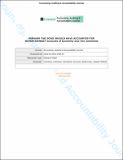Files in this item
Perhaps the Dodo should have accounted For Human Beings? : Accounts of humanity and (its) extinction
Item metadata
| dc.contributor.author | Gray, Robert Hugh | |
| dc.contributor.author | MIlne, Markus | |
| dc.date.accessioned | 2018-02-08T10:30:07Z | |
| dc.date.available | 2018-02-08T10:30:07Z | |
| dc.date.issued | 2018-03 | |
| dc.identifier | 248704475 | |
| dc.identifier | ea0cb2ca-93b6-4563-a0a7-e68498899039 | |
| dc.identifier | 85044078970 | |
| dc.identifier | 000427972500003 | |
| dc.identifier.citation | Gray , R H & MIlne , M 2018 , ' Perhaps the Dodo should have accounted For Human Beings? Accounts of humanity and (its) extinction ' , Accounting, Auditing & Accountability Journal , vol. 31 , no. 3 , pp. 826-848 . https://doi.org/10.1108/AAAJ-03-2016-2483 | en |
| dc.identifier.issn | 0951-3574 | |
| dc.identifier.uri | https://hdl.handle.net/10023/12691 | |
| dc.description.abstract | Purpose: We intend to offer a counter-narrative to those accounts of specific species extinction. Our intention is to offer a counter narrative that places humanity’s ways of organising at the core and recognises that only fundamental re-appraisal of (western) humanity’s current taken-for-granted narratives offers any hope for biodiversity and sustainability. Thus we seek to offer a narrative that might challenge producers of accounts of all sorts to reconsider the context and level of resolution of their accounts. We do this by first arguing that humankind is the root cause of most (if not all) current species extinctions. We then argue that such extinctions represent one reason why humanity might itself be threatened with extinction… or indeed, why human extinction might be a good thing. We need new accounts and utopian possibilities with which to imagine other, better, futures. Design/methodological/approach: The piece is an essay which assembles a wide range of literature in order to support its contentions. Findings: There are many individual accounts of species which explore the (albeit very serious) symptoms of a problem without, we maintain, examining the systematic source of the problem. The source problem is western mankind’s organisation and somewhat taciturn conception of humanity. There is a lack of accounts offering new possibilities. Research Limitations/Implications: The piece is an essay and, consequently limited to the quality of the argument presented. The essay suggests that the principal implications relate to (i) how producers of counter-accounts frame their construction of accounts and (ii) how accounts of species extinction need to be more cognizant of underlying causes. Practical Implications: Without substantial change, planetary ecology, including humanity, is very seriously threatened. Imagining a plausible future is a most practical act of faith. Social Implications: The essay suggests that as accountants we might think to approach our counter-accounts with a lower level of resolution: one that is directed towards a more challenging notion of what it is to be human. Originality/value: Whilst building upon the growing sophistication in our understanding of (new) accounts and responding to the emerging literatures on biodiversity, species extinction and utopian vision we offer what we believe to be a unique suggestion in the accounting literature about the extinction of mankind. | |
| dc.format.extent | 834280 | |
| dc.language.iso | eng | |
| dc.relation.ispartof | Accounting, Auditing & Accountability Journal | en |
| dc.subject | Humanity | en |
| dc.subject | Extinction | en |
| dc.subject | Narratives | en |
| dc.subject | Accounts | en |
| dc.subject | Utopian Method | en |
| dc.subject | Biodiversity | en |
| dc.subject | QH Natural history | en |
| dc.subject | HM Sociology | en |
| dc.subject | T-NDAS | en |
| dc.subject.lcc | QH | en |
| dc.subject.lcc | HM | en |
| dc.title | Perhaps the Dodo should have accounted For Human Beings? : Accounts of humanity and (its) extinction | en |
| dc.type | Journal article | en |
| dc.contributor.institution | University of St Andrews. School of Management | en |
| dc.identifier.doi | https://doi.org/10.1108/AAAJ-03-2016-2483 | |
| dc.description.status | Peer reviewed | en |
| dc.date.embargoedUntil | 2018-02-06 |
This item appears in the following Collection(s)
Items in the St Andrews Research Repository are protected by copyright, with all rights reserved, unless otherwise indicated.

